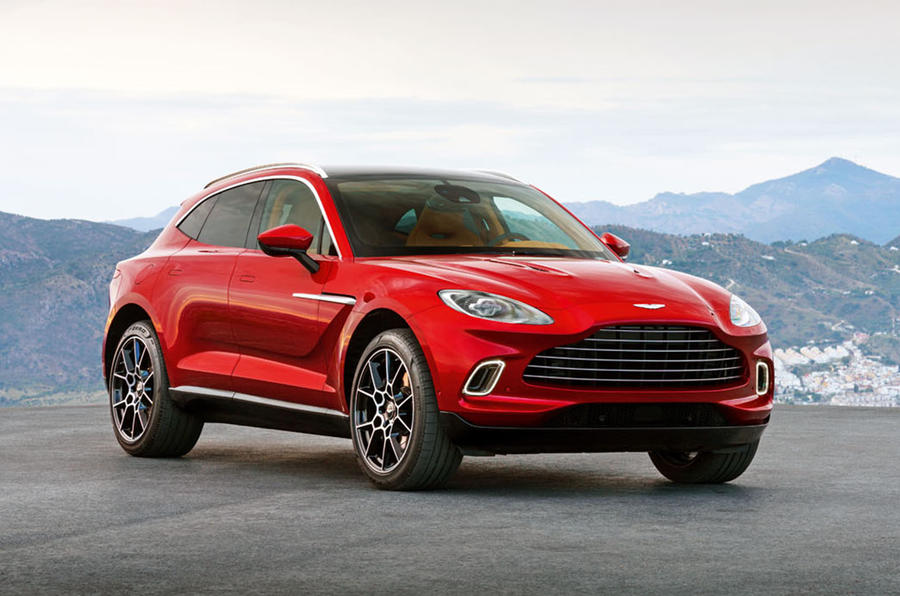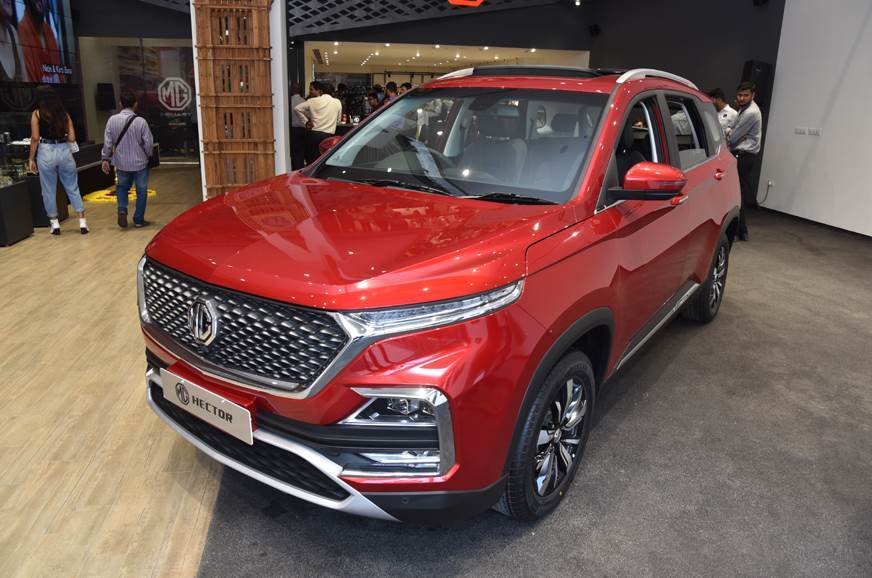
Aston Martin has officially unveiled its all-important SUV, dubbed the DBX – a model designed to open a vital, perhaps life-saving, new tranche of its global business. The five-seat 4x4 is powered by a 550hp version of the AMG-sourced 4.0-litre, turbocharged V8. Deliveries in international markets are expected in March 2020.
The DBX’s striking fastback looks are revealed here for the first time, although the company has been teasing market watchers for many months by displaying disguised prototypes in public.
The Aston Martin SUV’s arrival represents a unique case of a hard-pressed car company fighting fire with fire. Aston Martin, floated on the stock exchange just over a year ago, has had one of the toughest debuts ever for a listed company, shedding around three-quarters of its share capitalisation. But now that they’re seeing hard evidence of the DBX – a model from the brand-new St Athan factory designed for sales in the still-thriving luxury SUV market – some analysts have begun recommending Aston Martin stock for growth, a development the company’s hard-pressed CEO Andy Palmer always said would happen.
Aston has been working on the DBX project, including its new production hub in St Athan, Wales, since 2015 and driving its prototypes around in public for nearly two years. It aims to sell more than 4,000 units a year, initially boosting total Aston volume by two-thirds to more than 10,000, by far the greatest output in its 106-year history. Aided by the DBX’s sporty-looking fastback shape – with its traditional ‘DB’ grille, its elegantly sculpted haunches and its powerful, aerodynamic rear – market forecasts for demand are said to be strong.
The DBX is a late-comer to the sporting premium SUV market: Porsche has been in it for the best part of two decades. Lamborghini and Bentley are more recent arrivals and even Ferrari has fast-maturing plans.
But Aston Martin believes its combination of an all-new bonded aluminium platform (using techniques perfected in two generations of sportscars) plus the fact that the DBX’s structure is shared at the outset with no other model – Porsche and Lamborghini share structures, for instance – gives the new SUV considerable advantages. One is weight-saving: the DBX’s 2,245kg kerb weight does not make it light by any means, but it undercuts some rivals by as much as 400kg.
For now, the DBX’s engine is the AMG-sourced 4.0-litre V8 but a high compression ratio plus upgrades to the intercoolers and turbochargers lift power to 550hp at 6,500rpm and peak torque to 700Nm, delivered between 2,200rpm and 5,000rpm, with 0-96kph in 4.3sec and a top speed of 290kph.
New powertrains are coming for the DBX, and although Aston won’t give many details, it seems likely that they will include a plug-in hybrid (doubtless using know-how from technology partner Daimler). Meanwhile, the company has also been gathering experience of electric vehicles – at St Athan – with its limited-edition Rapide sedan.
With an overall length of just over 5m, the DBX fits almost exactly into a gap between Bentley’s Bentayga (5.14m) and Porsche’s Cayenne (4.92m). It is low and sporty in SUV terms – 74mm lower than the Bentley, 20mm lower than the Porsche – yet its 3.06m wheelbase is longer than both, allowing packaging that makes it unusually spacious for both people and luggage.
Palmer said the DBX’s specification has been guided by “external counsel”, including from a female advisory board set up soon after his arrival at Aston Martin five years ago. Palmer especially values female customers and has been successful at attracting them to the company’s other vehicles, especially in Asia and the US.
As you might expect of a company that brought in Lotus’s top chassis man – Matt Becker – to develop its cars’ dynamics, Aston has equipped the DBX with all of the suspension hardware a serious SUV needs to perform its wide spectrum of duties well. It has triple-chamber air suspension to vary spring rates, adaptive damping from Bilstein and a 48V anti-roll system that incorporates what Aston claims is an extremely quick-acting electric motor into its anti-roll bars to counteract body roll according to instructions from sensors all over the car.
There’s a smart all-wheel-drive system that features electronically controlled centre and rear differentials to distribute torque away from slipping wheels. In normal use, the car is 100 percent rear-driven – for high-speed handling reasons – but when necessary, just under 50 percent of torque is directed to its front wheels.
The DBX’s all-independent suspension can raise the car 45mm higher or lower it by 50mm from normal ride height and there are six adaptive driving modes (four on road, two off road). The steering is all electric and high geared, requiring 2.6 turns from lock to lock.
The car rides on 22-inch Pirelli-shod wheels available in two different styles and the brakes are steel discs, 410mm diameter with six-piston discs in front and 390mm diameter at the rear.
Inside, the DBX is extremely plush and almost infinitely configurable. All switches and controls have been designed specifically for this new model. Prominent features include a large pair of TFT screens (one central and one ahead of the driver) and a ‘bridged’ centre console that brings both elegance and space efficiency to the cabin.
The seats are derived from DB11 designs, to enhance sportiness, and among a plethora of imaginative options are a pet package (which carries a portable dog washer) and a snow package (which has boot warmers for keen skiers).
The first 500 DBX buyers get what Aston calls a ‘1913 Package’, whose name celebrates the marque’s 106 years of life by adding unique body and sill badges plus a commemorative plaque.
Each car will be inspected and endorsed by Andy Palmer and a special photographic build book will be signed by both Palmer and design boss Marek Reichman to underpin the fact that, after more than a century, Aston is now building a new kind of car.
Also see:
Aston Martin DBX image gallery
from Autocar India https://ift.tt/338zE3D
via IFTTT

No comments:
Post a Comment